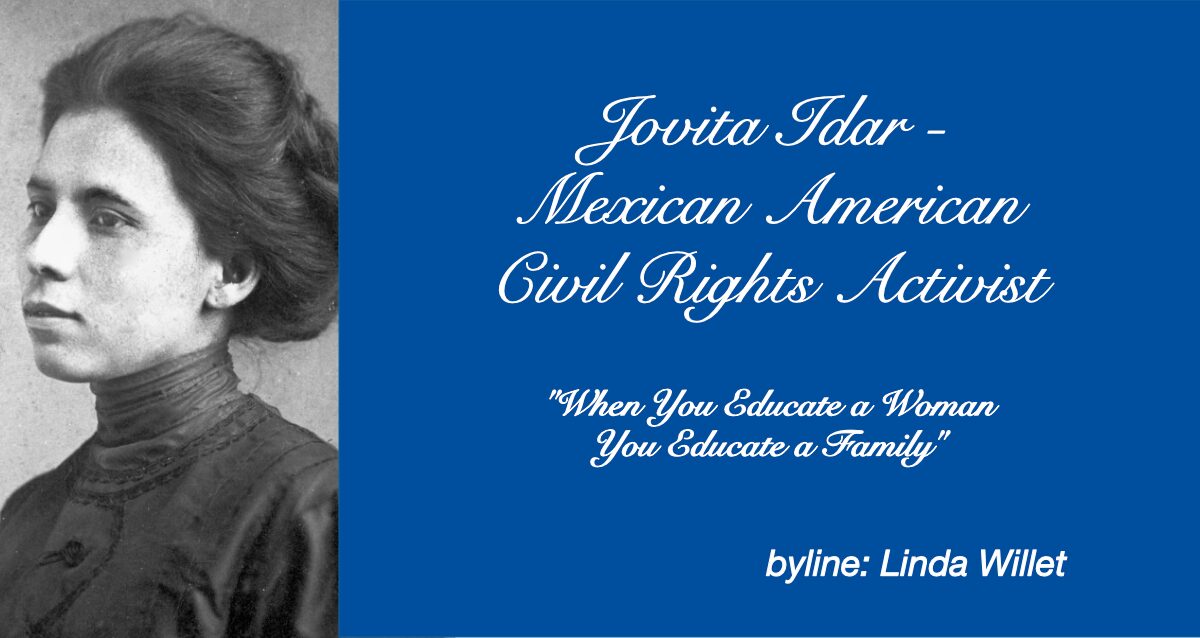Jovita Idar is an example of the many Hispanic activists who have fought for Mexican American rights and the preservation of the Hispanic culture. Jovita was born in Texas in 1885 to a family that was well educated and prosperous, but her parents brought up their children to advocate for better living conditions and civil rights for Mexican Americans who were living in poverty. Her father owned a newspaper, La Cronica.

In the early 1900s, Jovita taught in a Mexican American school, but she became discouraged by the lack of resources and inequality between schools for white children and those for Mexican American children. After a few years, she decided to use her talents as a journalist and organizer to work for education and better living conditions for all women and children.
In 1911, Jovita’s father set up a fraternal order that focused on Mexican American issues and held the first Mexican American Congress to bring delegates from both sides of the border together to work on issues such as lack of access to adequate education and economic resources. Jovita was a delegate to this first Congressional meeting and became convinced of the need for voting rights. Following the meeting, she wrote articles supporting women’s right to vote, and she and her brothers posted articles about the suffrage movement in her father’s newspaper. In the same year, Jovita launched and became President of the League of Mexican Women, which offered free education to Mexican children in Laredo and also provided food and clothing to people in need.
During the Mexican Revolution from 1910-1920, Jovita worked as a journalist and crossed the border to bring awareness about issues of poverty and inequality that Mexicans faced and to volunteer as a nurse in support of the revolution forces. To focus attention on what was happening in Texas, she wrote under a pseudonym to discuss the discrimination, poor economic conditions, decreasing use of the Spanish language, loss of cultural norms, and lynchings of Mexican Americans. She was horrified that in Laredo, Mexican Americans were not allowed to speak Spanish inside or out of school.
Before the revolution ended, Jovita returned to Texas and began working at El Progresso newspaper, where she wrote an article criticizing President Wilson for sending U.S. troops to the Texas-Mexico border, hoping to tame down the revolution. This article prompted the U.S. Army and Texas Rangers to destroy the printing presses. In spite of this setback, Jovita continued to write articles that advocated for fair conditions and justice for Mexican Americans.
When her father died in 1914, Jovita took over the El Progress newspaper. She and her husband Bartolo Juarez moved to San Antonio where they became active in the Democratic Party and advocated for women’s rights. Jovita continued to find ways to assist the Mexican American community, serving as the editor of a Methodist Church publication in Spanish, volunteering as an interpreter in a hospital, and establishing a free kindergarten for children in San Antonio. Throughout her life, she attempted to put her most famous words and motto into action: “When you educate a woman, you educate a family.”
Sources
:
https://en.m.wikipedia.org/wiki/Jovita_Idar
https://www.womenshistory.org/jovitaidar
www.nytimes.com
Overlooked No More: Jovita Idar, Who Promoted Rights of Mexican-Americans

